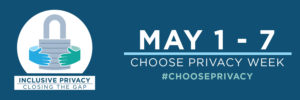Welcome to this week’s Tip of the Hat! This week marks the start of Choose Privacy Week, hosted by the ALA Office of Intellectual Freedom. We briefly covered CPW in our National Library Week newsletter, but we couldn’t pass up the chance to join in the festivities of a week dedicated to library privacy.
This year’s Choose Privacy Week is focusing on how privacy in libraries is vital for those who are otherwise targeted for surveillance and data-based discrimination elsewhere in the US. Library workers stress privacy as a core tenet of Intellectual Freedom; however, this focus can be very narrow with regard to protecting a subset of patron information from specific unauthorized uses and access, e.g. a government entity accessing a patron’s circulation records. This narrow interpretation of the role privacy plays in the library does not take into account the evolution of the role of data in libraries and in society. Data has taken its place as a critical tool in ensuring funding and continued operations. We see this evolution with the increasing prevalence of customer relations management systems, learning analytics, and identity-based services (such as RA21) in the library environment.
With the rise of data-as-valuable-asset, comes the dark side, or taking a cue from Bruce Schneier, the toxicity of data. Data has been used to target marginalized populations via surveillance and other means. How can data harm vulnerable populations? Taking a look around the Seattle area, here are two recent cases in which data collection inflicted real-world harm on people:
- ‘Privacy Is Becoming a Luxury’: What Data Leaks Are Like for the Poor
- Motel 6 to pay Washington $12M for giving information on 80,000 guests to ICE
Another resource highlighting past and potential harms is http://neveragain.tech/. This pledge site started when the current US president proposed a registry of Muslims in the US. The page highlights some of the ways that technology was used against marginalized populations throughout recent times, as well as the harms that come with data collection.
Reframing the conversation about why privacy is important in libraries requires rethinking the field’s approaches surrounding privacy practices and policies. Privacy with regard to pursuing intellectual interests needs to take into account the social factors that come into play when someone from a vulnerable population uses the library. Many libraries market themselves as a “third place” or a place where the community can gather together for a variety of reasons, be it studying, meetings, programs, or even a safer space to spend free time outside of the home, work, or school. While data is useful in relation to building and maintaining operations that best benefit all patrons in the library’s third place role, care needs to be taken to ensure that the same data is not used to harm patrons as demonstrated in the cases above.
If you are looking for how to approach your privacy practices with an equity lens, you will hear from a variety of backgrounds and viewpoints during this year’s CPW. Maybe you’ll find something that you haven’t considered in relation to your privacy practices, or find an opportunity to be proactive in building trust with patrons. In either case, we’re looking forward to finding out more about how libraries can align privacy with equity during Choose Privacy Week!
